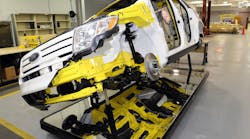A “decentralized” and “rapid approach” to innovation will be the critical drivers of success for the automotive industry in the near future, according to a new report – demanding that more research and development (R&D) dollars be spent on ways to boost fuel economyand “communized” global platforms, while helping find new ways to attract younger buyers.
“Right now, the automotive industry is in a phase of both rapid and broad technological innovation that spans several scientific disciplines—chemistry (batteries), materials science (lightweight materials), and consumer electronics (infotainment), to name a few,” noted Scott Corwin and Brian Collie, partners with global management consulting firm Booz & Co. and authors of its 2013 Automotive Industry Perspective report.
“Given the span of innovation, it’s becoming exceedingly difficult and too costly for OEMs to ‘go deep’ across all technologies,” they added. “Additionally, some nonautomotive players have superior specialized technical capabilities and R&D scale in specific disciplines. These factors are fundamentally shifting the industry’s long-standing model of innovation[from one] centered around large OEMs and major suppliers toward a more decentralized approach in which OEMs serve as integrators, with large and small suppliers playing an expanded role.”
Corwin and Collie argue that the automotive industry will need to innovate rapidly in order to remain competitive in an ever-changing market, where the goals include hitting more stringent fuel economy standards, boosting the electronics in cars, developing common platforms around the globe, and attracting younger buyers.
“Doing this requires significant R&D dollars, both within OEMs and increasingly across a broader innovation landscape,” they said.“More than ever, advances are taking place in systems that have highly intricate linkages throughout the entire vehicle and rely on a wider variety of diverse disciplines.”
Take the growing array of fuel and powertrain technologies: With numerous options and no clear winner, OEMs and suppliers are placing bets on a wide range of technologies, Corwin and Collie wrote.
“Some of these require step changes in development, such as designing and manufacturing automotive-scale advanced lithium-ion batteries for electrical vehicles,” they noted. “[But] the addition of such a large onboard energy storage device in turn creates new requirements—like advanced thermal management techniques to maintain narrow temperature operating zones—as well as opportunities to leverage that electrical energy in new ways and improve overall vehicle performance.”
At the same time, the greater penetration of smart phones and tablets is leading consumers to expect more advanced electronic content in their automobiles – and with much faster refresh cycles than have been typical in the industry, Corwin and Collie explained.
“In addition to basic infotainment systems that provide vehicle information and entertainment options, more active driver-assistance technologies such as collision avoidance and autonomous parking are becoming the norm,” they pointed out.
Government policy also affects the development of new automotive technologies, Corwin and Collie added – especially in the U.S. market.
“New fuel efficiency standards, which take effect in 2017, will require automakers to reduce vehicle weight and drag by incorporating new lightweight materials for auto body parts and internal components, for example,” they said.
“While lightweight materials such as high-strength steel and aluminum are likely to have a greater presence in the automobile, ultra-lightweight materials such as carbon fiber will also gain acceptance, as increased industry adoption drives scale that reduces the cost of such components to more competitive levels,” Corwin and Collie emphasized.
“Developing these materials requires partnerships between materials suppliers, OEMs, and component manufacturers,” they noted. “Government regulation will also be a key factor in alternative powertrains. For example, the means of calculating CAFE [corporate average fuel economy] compliance for electric, plug-in hybrid, and flexible fuel vehicles, combined with the level and structure of subsidies for emerging powertrains and electric recharging infrastructure, will affect customer perceptions and economics substantially—and drive adoption of new technologies.”
While those are all complex issues, there is no turning back, Corwin and Collie pointed out.
“In an era of rapid and accelerating technological advances, companies must build the superior innovation capabilities essential to success,” they said. “OEMs and suppliers alike will need to adapt their operating principles to allow for a more thoughtful and strategicapproach. They must decide which technologies to focus on in a proprietary manner and how to develop them in a way that will increasingly, and with greater certainty, generate high returns on a growing investment in innovation.”



